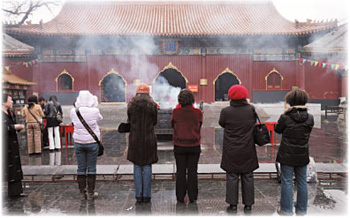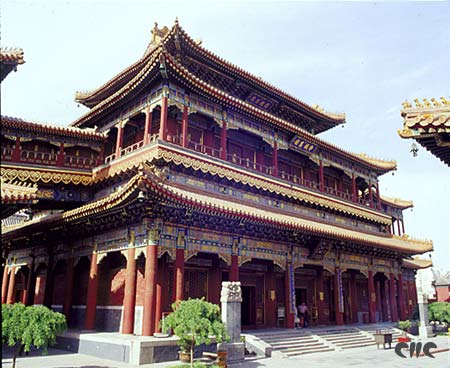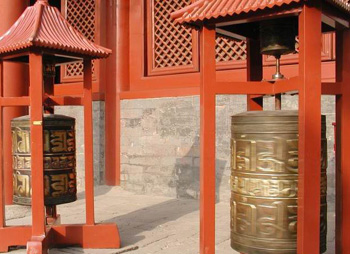| Tools: Save | Print | E-mail | Most Read |
| Temple Treats |
| Adjust font size: |
It is estimated that there were more than 700 temples in Many of the temples were damaged in the "cultural revolution" (1966-76) or taken over by residents. But with the government's restoration efforts, some remain intact and are becoming increasingly popular with worshipers and tourists. Here we list a selection of the capital's best temples.
A famous tourist destination, and also the biggest Tibetan Buddist temple of the
Andingmen Dongdajie, Dongcheng District. 6404-9027. Bus routes: 13, 62, 44, 406 at Yonghegong station; or take the subway to arrive at Yonghegong. This Buddhist temple, also called North of Fuchengmennei Dajie. 6616-0211. Bus routes: 13, 101, 102, 103, 823, 812, 814, at Baitasi station. Built in the Jin Dynasty, this temple is more than 800 years old. The architecture inside is preserved from the Ming Dynasty, when it was rebuilt and given the present name. The bronze statues of Buddha are extremely precious. There are also stone tablets engraved with a poem by Qianlong, a Qing Dynasty emperor. The temple is where China Buddhist Association is located, and is the center of the country's Buddhist activities. Northwest corner, Xisi Crossroad, Xicheng District. 6616-0907. Bus routes, 13, 101, 102, 105, 823, 812, 814, at Xisi station. Established 1,300 years ago, this temple is the oldest and biggest temple in 7 Fayuansi Qianjie, Xuanwu District. 6353-3966. The biggest Taoist temple in Baiyun Lu, Xicheng District. 6346-3531. Bus routes: 19, 414, at Baiyunguan station, or 114, 308, 937 at Baiyunguan station and walk south.
Named after a big bronze bell in the temple, it is now also known as the North side of the North Third Ring Road. 6255-0819. Bus routes: 302, 367, 718, at Dazhongsi station. With more than 600 years of history, this Taoist temple is the biggest of its kind for the Zhengyi School of Taoism. It is known for its stone tablets engraved with scriptures. There are more than 3,000 statues of gods. The architectural art and scale is among the best in North of Chaoyangmenwai Dajie. 6551-0151. Bus routes: 110, 112, 109, at Shenlu Jie station; or take subway, get to Chaoyangmen station and walk east. Where emperors paid homage to Confucius and where the best Chinese scholars studied. Guozijian Jie. 8401-1977. Bus routes: 13, 406, 807, at Guozijian station, or take the subway, get off at Yonghegong station and walk south. This temple is named after jietai, the altar where monks are initiated into monkhood. It is known for having the most complete and well-preserved group of stone Buddha carvings. Shimenying, Mentougou District, west Named after the legend of the red snail fairy. This temple was once home to many distinguished monks. The mountain on which it sits also has some fantastic views. This temple is famous for its collection of caves with stone scriptures, Buddhist relics, and beautiful mountain views. At the foot of Baidaishan, Fangshan District, southwest of (
|
| Tools: Save | Print | E-mail | Most Read |
 |
| Related Stories |
|
Product Directory China Search |
Country Search Hot Buys |


